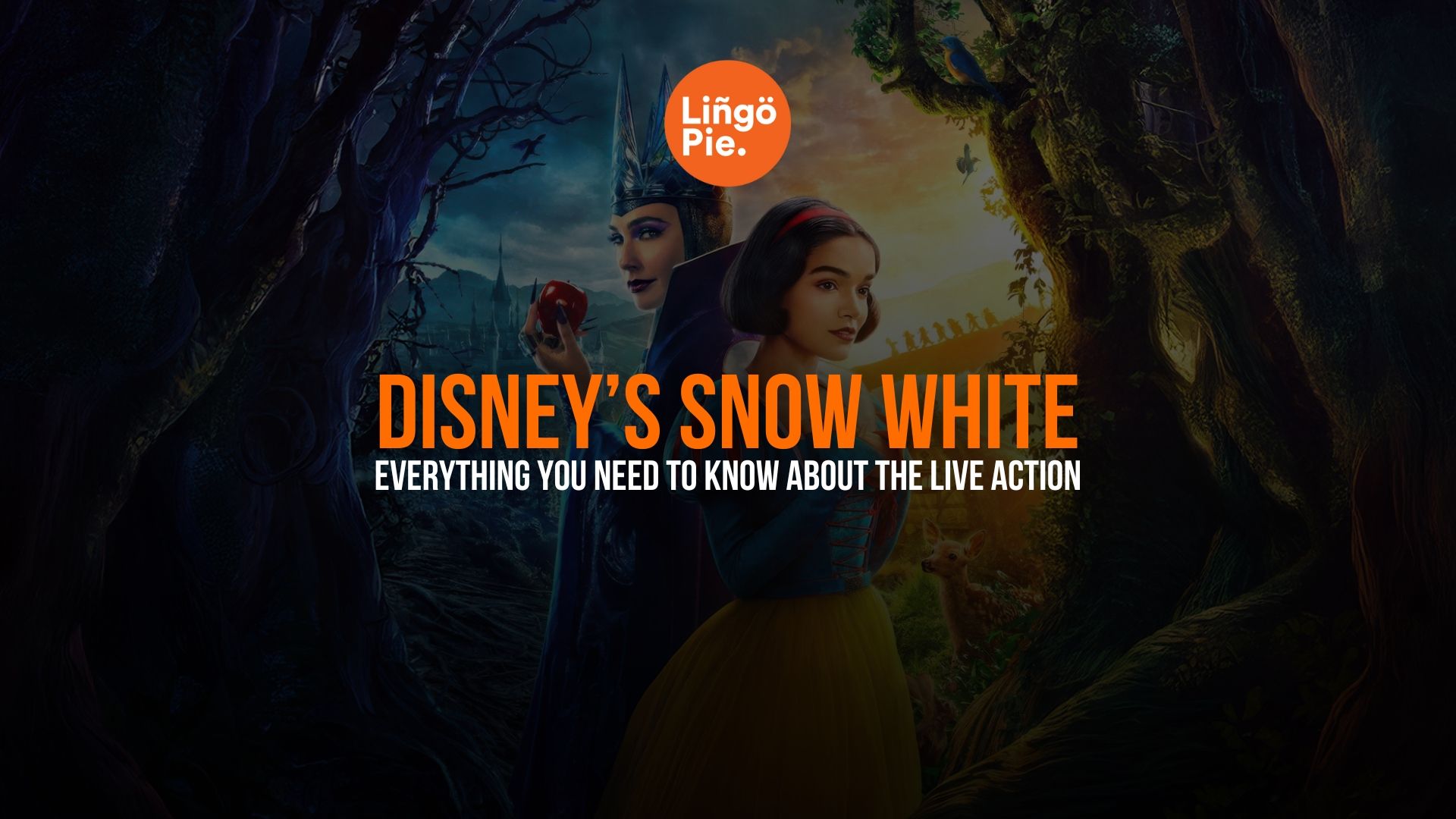German has always been considered one of the hardest languages to learn, but honestly, it shouldn't have to be. In fact, you can start learning through one of the easiest, low-barrier references out there: short stories in German! These bite-sized narratives provide the perfect entry point for beginners looking to build vocabulary and comprehension skills while enjoying authentic content.
In this post, I'll show you the best German short stories every beginner should read. I'll also introduce you to Lingopie Short Stories - the coolest new feature to help you learn German fast. Whether you're just starting out or looking to strengthen your foundational skills, these stories will make your learning journey both enjoyable and effective.
- 5 German Cooking Shows For Learning German Culinary Terms
- 20 German Slang & Phrases You Need to Learn
- How To Say I Love You In German: 8 Easy Expressions

Why German Short Stories Are Perfect for Beginners
Learning a new language can feel overwhelming at first, especially one with German's reputation for complex grammar and lengthy compound words. But here's the secret that experienced language learners know: German short stories are actually one of the most accessible and enjoyable entry points into the language!
When you're just starting out with German, short stories offer several unique advantages that traditional textbooks simply can't match:
- Contextual learning: Instead of memorizing isolated vocabulary lists, you see words used naturally in meaningful contexts
- Emotional connection: Stories create emotional responses that help your brain form stronger memory connections
- Manageable chunks: Unlike novels, you can finish a short story in one sitting, giving you that motivational boost of completion
- Authentic language: You're exposed to how German is actually used by native speakers
- Cultural insights: Stories naturally introduce you to German perspectives, humor, and cultural references
Think about it - children don't learn their first language by studying grammar rules. They absorb it through stories, conversations, and meaningful interactions. Why not apply the same natural approach to your German learning journey?

What Are The Best Types Of German Short Stories For Beginners
For those just starting their German adventure, we highly recommend focusing on two main categories of short stories:
1. General Short Stories for Language Learners
These are stories specifically designed or adapted for German learners. They typically feature:
- Simplified vocabulary and sentence structures
- Gradual introduction of new words
- Contemporary, relevant themes
- Often include helpful features like vocabulary lists, comprehension questions, or English translations
- Progressive difficulty levels so you can challenge yourself as you improve
These stories give you a gentle introduction to reading German while still providing engaging content.
2. Traditional German Short Stories
Germany has an incredibly rich literary tradition, and many classic German short stories have been adapted for language learners. These include:
- Fairy tales by the Brothers Grimm (Märchen)
- Folk tales and legends (Volksmärchen)
- Simplified versions of classic German literature
- Children's stories that native German speakers grow up with
The beauty of traditional stories is that they connect you directly to German cultural heritage. When you read "Rotkäppchen" (Little Red Riding Hood) or "Die Bremer Stadtmusikanten" (The Bremen Town Musicians), you're experiencing the same stories that have shaped German cultural identity for generations.
Traditional German Short Stories
I've pulled together six quintessentially German tales that will jumpstart your language-learning journey!
1. Hänsel und Gretel

Ever felt lost in the woods of German grammar? "Hänsel und Gretel" follows two clever kids who get abandoned in the forest only to stumble upon a tempting gingerbread house with a not-so-sweet owner. The siblings must work together to outsmart a hungry witch and find their way back home.
This story is great for beginners because it uses everyday words about family, food, and nature that you’ll actually use in real conversations. The repeated phrases (like when the witch checks if Hänsel’s finger is plump enough) give your brain multiple chances to absorb the same patterns naturally. Since you probably already know the basic plot, you can focus on catching German words rather than trying to figure out what's happening.
2. Schneewittchen (Snow White)

"Schneewittchen" introduces us to a princess with "skin as white as snow, lips as red as blood, and hair as black as ebony" who's on her jealous stepmother's hit list. After escaping death, Snow White finds safety with seven quirky dwarfs until a poisoned apple puts her in a deep sleep that only true love can break.
The repeated mirror dialogue gives you practice with question forms, while the story introduces useful descriptive words for appearances and emotions. The familiar plot helps you follow along while learning new German vocabulary.

3. Rumpelstilzchen

In "Rumpelstilzchen," a boastful father lands his daughter in hot water by claiming she can spin straw into gold. When the king locks her in a tower to prove it, a mysterious little man offers to help—but at the steep price of her firstborn child. After she becomes queen and has her baby, he gives her one chance to keep her child: guess his unusual name within three days.
If you want to learn practical lines and everyday verbs, then this is a must-read! The repetitive guessing game toward the end naturally reinforces question patterns and vocabulary. And when you finally reach the dramatic moment where his strange name, "Rumpelstilzchen," is revealed, you get to practice uniquely German sounds in a context you'll never forget.
4. Der Nussknacker und der Mausekönig (The Nutcracker and the Mouse King)

E.T.A. Hoffmann's beloved Christmas tale follows young Marie, who receives a nutcracker doll that comes alive at midnight to battle the seven-headed Mouse King. The story blends reality and fantasy as Marie helps her nutcracker defeat his enemy and travels to his magical kingdom.
This story fills your German vocabulary bank with festive words, toy names, and holiday traditions that Germans actually use! The battle scenes teach you action verbs in context, while the fantasy elements help you express imagination in German.
5. Das Kalte Herz (The Cold Heart)

In this Black Forest tale, poor charcoal-burner Peter Munk dreams of wealth and respect. He trades his warm human heart for a cold stone one from the evil Dutch Michel. While Peter gets rich, he loses his ability to feel joy or love, eventually doing terrible things. When regret finally hits him, he must outsmart Michel to get his real heart back and rediscover what truly matters.
This story might stretch your German a bit more, but it rewards you with a richer vocabulary about nature, emotions, and values that will elevate your expression. The Black Forest setting immerses you in a region that Germans themselves associate with mystery and folklore.
6. Das Märchen von der Padde

In this lesser-known gem, a beautiful young woman nicknamed Parsley (for her love of the herb) steals from a witch and gets transformed into a toad. Meanwhile, three princes compete in challenges to determine who will inherit the throne. The youngest prince wins the first two tasks with help from a mysterious toad. For the final challenge—finding the most beautiful bride—the toad transforms back into Parsley, revealing her true identity and helping the prince win.
The story's structure—with three clear challenges and solutions—creates natural repetition that helps cement new vocabulary without feeling repetitive. Each task introduces useful verbs and problem-solving language you can apply to real-life situations, making it perfect for building your German skills through an engaging narrative.
Easy German Short Stories
1. "Die Bremer Stadtmusikanten" (The Bremen Town Musicians)

This timeless folktale, penned by the Brothers Grimm, resonates with audiences of all ages due to its whimsical narrative and enduring themes of camaraderie and resilience.
Suitable for: Beginning German learners
Why Learn It: "Die Bremer Stadtmusikanten" serves as an excellent introduction to German fairy tales, featuring simple language and a straightforward plot that facilitates comprehension for novice learners. Its popularity lies in its ability to engage readers while imparting foundational vocabulary and grammar.
Where to Find It: Available in various anthologies of Grimm fairy tales, as well as online resources such as websites with "Grimms Märchen" stories in German.
2. "Rotkäppchen" (Little Red Riding Hood)

Another classic from the Brothers Grimm, "Rotkäppchen" captivates audiences with its cautionary tale of trust and deception, weaving a narrative brimming with suspense and moral lessons.
Suitable for: Beginning to intermediate German learners.
Why Learn It: This beloved fairy tale introduces learners to essential vocabulary related to animals, nature, and everyday objects. Its familiarity makes it an accessible entry point for beginners while offering intermediate learners opportunities to deepen their understanding of German syntax and narrative structures.
Where to Find It: Included in collections of Grimm fairy tales, as well as online platforms specializing in German literature for language learners.
3. "Dino Lernt Deutsch" (Dino Learns German)

"Dino Lernt Deutsch" is a series of short stories designed specifically for German language learners, following the adventures of a young man named Dino as he navigates life in Germany.
Suitable for: Beginning to intermediate German learners
Why Learn It: These stories provide an engaging blend of language learning and cultural immersion, offering readers a glimpse into everyday scenarios while reinforcing vocabulary and grammar concepts. "Dino Lernt Deutsch" is lauded for its relatable characters and simplified language tailored to learners' needs.
Where to Find It: Available in convenient PDF format on language learning platforms such as Lingopie, offering learners a comprehensive resource for enjoyable reading practice.
4. "Tom Sawyers Abenteuer" (The Adventures of Tom Sawyer)

Mark Twain's iconic novel has been translated into numerous languages, including German, captivating readers with its adventurous spirit and timeless themes of friendship and adolescence.
Suitable for: Intermediate to advanced German learners
Why Learn It: While more challenging than traditional short stories, "Tom Sawyers Abenteuer" offers intermediate and advanced learners a rewarding opportunity to engage with authentic German literature. Exploring the original narrative allows readers to enhance their reading comprehension skills and expand their vocabulary in a meaningful context.
Where to Find It: Available in bookstores and online retailers offering German translations of classic literature, as well as digital libraries catering to language learners.
5. "Der Kleine Prinz" (The Little Prince)

Antoine de Saint-Exupéry's masterpiece transcends language barriers with its poignant exploration of love, friendship, and the human condition, making it a beloved classic among readers worldwide.
Suitable for: Intermediate to advanced German learners
Why Learn It: "Der Kleine Prinz" presents a compelling challenge for learners seeking to immerse themselves in a rich literary narrative. While more complex than typical short stories, its profound themes and lyrical prose offer advanced learners an opportunity to refine their language skills and deepen their understanding of German culture.
Where to Find It: Widely available in bookstores and online platforms offering German translations of literary classics.
6. "Max und Moritz" (Max and Moritz)

Written by Wilhelm Busch, "Max und Moritz" is a comedic masterpiece that has delighted readers for generations with its mischievous protagonists and clever rhymes.
Suitable for: Intermediate German learners
Why Learn It: This iconic work showcases the wit and humor of German literature, presenting learners with a delightful challenge as they navigate the linguistic intricacies of Busch's verse. Its episodic structure and vivid illustrations make it an engaging choice for intermediate learners seeking to enhance their reading skills.
Where to Find It: Available in print and digital editions, including annotated versions designed for language learners.
7. "Die Verwandlung" (The Metamorphosis)

Franz Kafka's novella is celebrated for its surreal narrative and existential themes, offering readers a thought-provoking exploration of identity and alienation.
Suitable for: Advanced German learners
Why Learn It: While "Die Verwandlung" presents a significant challenge due to its complex themes and vocabulary, advanced learners can derive immense satisfaction from grappling with Kafka's masterful prose. Engaging with this seminal work allows readers to hone their critical thinking skills and deepen their appreciation for German literature.
Where to Find It: Available in print and digital editions, as well as online resources offering supplementary materials for studying Kafka's works.
8. "Märchen aus 1001 Nacht" (Tales from 1001 Nights)

This collection of Middle Eastern folktales has captivated readers for centuries with its enchanting tales of adventure, magic, and romance.
Suitable for: Advanced German learners
Why Learn It: Exploring "Märchen aus 1001 Nacht" provides advanced learners with a captivating glimpse into diverse cultures and storytelling traditions. While challenging, the richness of these tales offers readers a rewarding opportunity to expand their vocabulary and cultural knowledge in a foreign language context.
Where to Find It: Available in various editions, including annotated versions and bilingual editions for language learners.
9. "Die Judenbuche" (The Jew's Beech)

An influential work of German Romanticism, "Die Judenbuche" by Annette von Droste-Hülshoff is renowned for its haunting atmosphere and exploration of guilt and redemption.
Suitable for: Advanced German learners
Why Learn It: Engaging with "Die Judenbuche" allows advanced learners to delve into the complexities of German literature, grappling with themes that resonate across cultures and periods. While challenging, this novella offers readers a profound literary experience that fosters critical thinking and cultural appreciation.
Where to Find It: Available in print and digital editions, as well as online platforms specializing in German literature for advanced learners.
10. "Die Räuber" (The Robbers)

Friedrich Schiller's seminal drama, "Die Räuber," is hailed as a cornerstone of German Romanticism, exploring themes of rebellion, idealism, and betrayal.
Suitable for: Advanced German learners
Why Learn It: Delving into "Die Räuber" offers advanced learners a compelling opportunity to engage with the dramatic tradition of German literature. By analyzing Schiller's complex characters and intricate plot, readers can sharpen their analytical skills while deepening their understanding of German cultural history.
Where to Find It: Available in print and digital editions, as well as online resources offering supplementary materials for studying Schiller's works.

Learn German With Lingopie's Short Stories
Learning German just got easier and more enjoyable! Lingopie's new Short Stories feature puts German fluency within your reach through engaging, bite-sized stories designed specifically for language learners. Each story highlights German words as they're spoken, creating an immediate connection between sound and spelling.
Lingopie's German Short Story collection brings the language to life through captivating topics that spark curiosity while building essential vocabulary. This story-based approach helps you absorb new German words faster than traditional methods because your brain naturally processes language more efficiently when it's presented in a narrative context.
- Quick 3-10-minute reads that fit perfectly into your daily routine
- Click any word to see its translation and automatically add it to your personal vocabulary collection
- Engaging quizzes reinforce what you've learned after each story
- Authentic German pronunciation paired perfectly with text so you learn proper speaking from day one
- Visual progress tracking shows your improvement and motivates you to keep going
The best part? You're not just memorizing random words—you're experiencing German in context through stories that capture your imagination. Whether you're commuting, taking a coffee break, or winding down before bed, these short stories make learning German feel less like work and more like entertainment.
Ready To Learn With Lingopie?
Ready to experience reading in German? Access Lingopie's Short Stories through your account dashboard and click the "Short Stories" tab. The feature is currently optimized for desktop viewing, with the mobile experience launching soon.
Don't worry about your current level—these stories are designed to be accessible even if you're just starting out. Begin with just one story today, and watch how quickly your German understanding improves when you learn through engaging narratives rather than dry textbooks!
Your journey to German fluency is just a story away. Which one will you read first?
FAQs: Short Stories in German to Elevate Your Studies
In this section, we provide answers to common questions relating to short stories in German, as well as learning German in general.
Is it difficult to learn German?
Learning German can pose challenges, like any language, but with dedication and effective resources like Lingopie, it becomes manageable. Structured learning, consistent practice, and immersion through various mediums can significantly aid in mastering German.
Can I learn German by watching TV?
Yes, watching German TV shows with Lingopie's language learning features can be an effective method. It exposes learners to authentic language usage, improves listening comprehension, and enhances vocabulary acquisition. Lingopie's interactive subtitles and language tools facilitate understanding and engagement, making TV watching a valuable learning tool.
Where to find easy German short stories?
There are so many places but in this case - just Google it. Also, Language Learning Apps: Many language learning apps, such as Duolingo, Babbel, and Rosetta Stone, offer modules or sections dedicated to short stories in German for learners at different proficiency levels.
What are popular German fairy tales?
Easy German short stories are available on platforms like Lingopie, which curates content specifically designed for language learners. These stories feature simplified language, engaging plots, and interactive tools to support comprehension. Lingopie's diverse collection ensures learners at all levels can find suitable material to practice and enhance their German skills.





![10 Best Spanish Short Stories For Beginners [Adults And Kids]](/blog/content/images/2023/12/Spanish-1-5.png)




